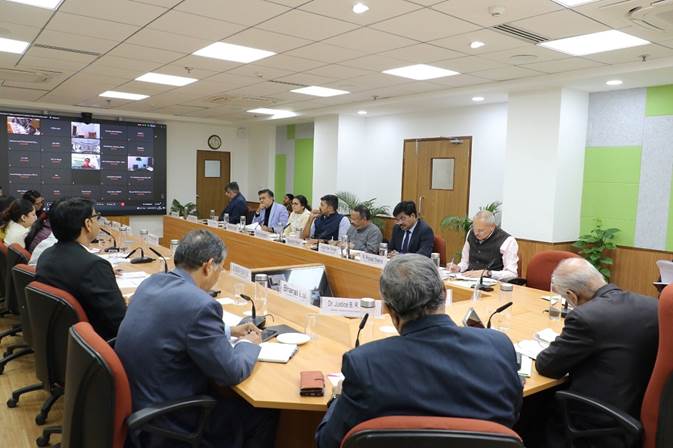NHRC, India Chairperson, Justice Shri V. Ramasubramanian expresses concern over the continued incidents of deaths of sanitation workers despite the legal provisions to eradicate manual cleaning of sewage and hazardous wasteEmphasises the need for running a pilot project using technology/ robots for cleaning sewer lines and septic tanks, to begin with one state for subsequent replication in other parts of the country
NHRC, India Secretary General Shri Bharat Lal says, the Commission is following up on the implementation of mechanized cleaning processes by various states
Among various suggestions, transparency stressed in manual scavenging data and sewer death reporting, budget analysis and awareness campaigns under SBM and NAMASTE schemes
The National Human Rights Commission (NHRC), India organised an open house discussion in hybrid mode on ‘Dignity and Liberty of the Individuals- Rights of Manual Scavengers’ at its premises in New Delhi. The discussion was chaired by the NHRC, India Chairperson, Justice Shri V. Ramasubramanian in the presence of Members, Smt. Vijaya Bharathi Sayani and Justice (Dr) Bidyut Ranjan Sarangi, Secretary General, Shri Bharat Lal and other senior officers. Attendees included representatives from various ministries and state governments, NGOs, human rights defenders, UN agencies, private organizations, and research scholars, contributing to discussions on pertinent issues on rights of manual scavengers and ensuring dignity to them.
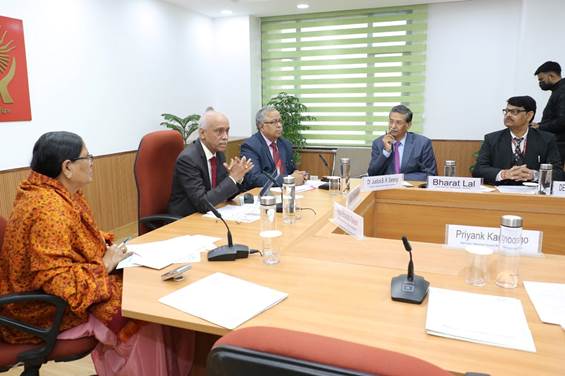
The NHRC, India Chairperson said that manual scavenging is one area that is being tackled legislatively, managed executively and supervised judicially to eradicate it. However, it is concerning that the deaths of sanitation workers are still happening despite the legal provisions to eradicate manual cleaning of sewage and hazardous waste.
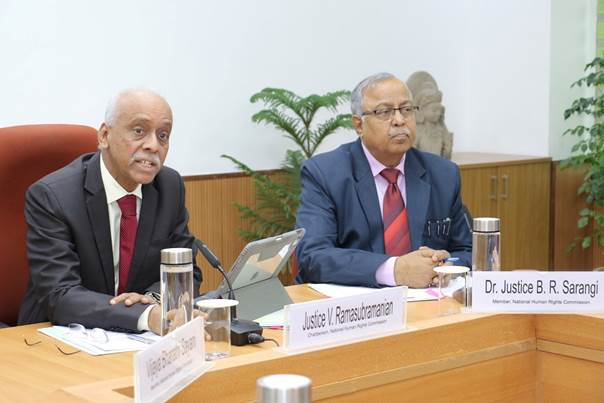
Justice Ramasubramanian said that it is necessary to study and understand the causes to suggest remedial measures. He also stressed the need for running a pilot project using technology/ robots for cleaning sewer lines and septic tanks to begin with one state to see its outcome and further replication in other parts of the country.
Before this, setting the agenda of the discussion, NHRC, India Secretary General, Shri Bharat Lal said that the Commission has taken up the issue of implementation of mechanized cleaning processes by various States and the steps taken by them in this regard. It has come out that various states have prepared up to three years programme for all Urban Local Bodies in accordance with the guidelines issued by the Supreme Court in Dr. Balram Singh v/s Union of India & Ors. case. He also highlighted how certain castes and communities are disproportionately affected by this practice.
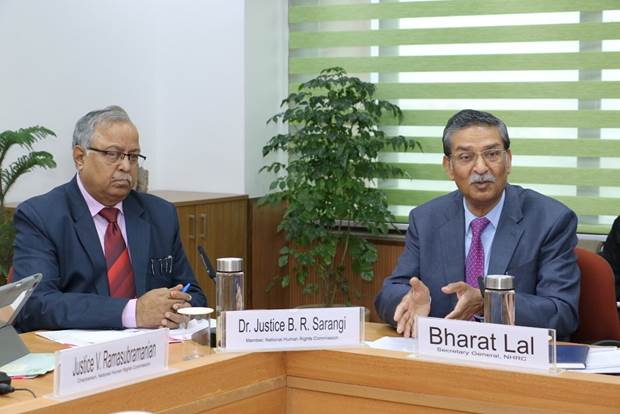
Earlier, NHRC, India Joint Secretary, Shri Devendra Kumar Nim gave an overview of the three technical sessions- ‘Addressing the issue of deaths in septic and were tanks in India,’ ‘The need for a complete ban on manual scavenging,’ and ‘Rehabilitation measures for manual scavengers: A path towards dignity and empowerment and the way forward.’ He said that manual scavenging is one of the biggest challenges facing society, which needs to be addressed with concerted collective efforts.
The speakers included Shri Prabhat Kumar Singh, Managing Director, National Safai Karamacharis Finance & Development Corporation, Shri Bezwada Wilson, National Convenor, Safai Karamchari Andholan, New Delhi, Shri Sujoy Majumdar, Senior WASH specialist, UNICEF India, Shri Yusuf Kabir, Water Sanitation and Hygiene Specialist, UNICEF, India, Rohit Kakkar, CPHEEO, Shri Rashid Karimbanakkal, Director, Genrobotics Innovations, Kerala, Baishali Lahiri, International Labour Organisation, Dr Vinod Kumar, Law and Director of Centre for Human Rights and Subaltern Studies, National Law University, Manjula Pradeep, WAYVE Foundation, Ms. Raj Kumari, Solinas Integrity Pvt. Ltd., Tamil Nadu, Prof. Sheeva Dubey, FLAME University, Pune, Shri M. Krishna, Managing Director, Kam-Avida Enviro Engineers Pvt. Ltd., Ms Smriti Pandey, Consultant, NITI Aayog, among others.
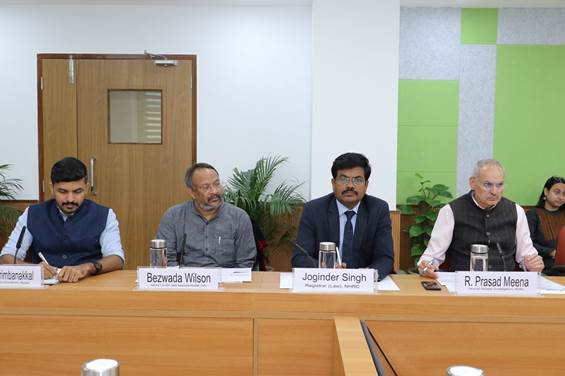
Some of the suggestions emanated from the discussions are as follows;
i.) Need for better representation and ground-level monitoring to ensure effective welfare implementation;
ii.) Conduct surveys for effective implementation of rehabilitation programmes and minimum wages;
iii.) The distinction between sanitation workers and manual scavengers in the 2013 Act is necessary;
iv.) Incentivize mechanization for cleaning and training for the same empowering women-led SHGs for sustainable livelihoods;
v.) Transparency is needed in manual scavenging data and sewer death reporting, budget analysis, and awareness campaigns under SBM and NAMASTE schemes;
vi.) Capacity-building training for the people involved in manual scavenging and sewer cleaning;
vii.) Give financial assistance to those coming up with technological innovations for hazardous waste cleaning;
viii.) Empanelment of de-sledging market and regulating its operations;
ix.) Providing of safety gear and conducting of awareness workshops;
x.) Need for a monitoring mechanism to identify the persons involved in manual scavenging to create a database for health insurance, education, etc;
The Commission will further deliberate upon these suggestions for ensuring the implementation of legal and policy provisions and address the gaps therein for an effective end to the manual cleaning of hazardous and sewage waste as well as proper rehabilitation of the persons involved in such works.
*****
NSK

